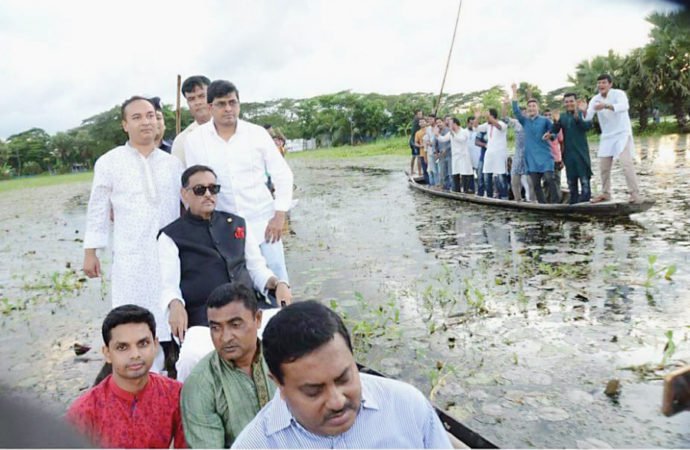‘We could not continue our election campaign, but we were able to reach the local people through relief distribution programmes, communicating with them in the process’
Party insiders said the Awami League activists had geared up to launch their campaign for the election, but it did not progress much due to these issues that put the election on the backburner for the central leaders.
Speaking to the Dhaka Tribune, several senior leaders of the party said back in May, Awami League President and Prime Minister Sheikh Hasina directed everyone to focus on the election campaign, saying from now on, ensuring people’s confidence in the party was top priority.
She also warned that anyone who failed to establish a connection with the voters of their constituencies would not get the ticket to the polls.
Following her instruction, the party activists, especially at the grass-roots level, started campaigning for the election and organised different programmes to reach out to the voters.
However, before the campaign could really take off, it came to a screeching halt when the Appellate Division of the Supreme Court scrapped the 16th Constitutional Amendment, taking away parliament’s power to impeach higher court judges.
In the July 3 verdict, Chief Justice Surendra Kumar Sinha, who led the Appellate Division bench, took the government to task over several issues, including corruption and lack of good governance.
Speaking on condition of anonymity, some senior Awami League leaders said the party’s high command was upset that the chief justice had criticised the government. The party and its affiliate organisations staged demonstrations around country, saying the chief justice had undermined Bangabandhu Sheikh Mujibur Rahman’s leadership during the Liberation War.
While strongly condemning the chief justice’s observations, the central leaders also became focused on finding ways to resolve this issue – which included discussions with the chief justice – as well as building public and civil society’s opinion against the verdict, especially when BNP was openly praising it.
Because of this situation, the activists running the election campaign lost the guidance of the central leaders, and it came to a halt.
While the debate over the 16th Amendment was still a hot topic, monsoon floods struck the country, particularly the northern and northeastern regions, inundating at least 20 districts.
The flood washed away homes and livestock, damaged crop fields and displaced hundreds of thousands of people. According to the Directorate General of Health Services, at least 198 people died and around 6.9 million people were affected during the floods between July 16 and August 29.
In such circumstances, providing aid and medical help in the flood-affected areas became a priority for the ruling party, pushing the election further into the back seat, the senior leaders said.
The latest crisis that the government is facing is the influx of Rohingya refugees into the country.
Around 123,000 Rohingya fled to Bangladesh since violence erupted again in Myanmar in late August. The renewed bloodshed in Myanmar’s northwestern Rakhine state was triggered by an attack on August 25 on dozens of police posts and an army base by Rohingya insurgents. The ensuing clashes and a military counter-offensive have killed at least 400 people.
The latest bout of Rohingya influx has become a massive cause for concern for the ruling party.
During a meeting of the central committee secretaries on August 29, the party leaders agreed that providing shelter to the increasing number of fleeing Rohingya was putting Bangladesh in a difficult situation, the senior leaders said.
Speaking at an event in Dhaka on Tuesday, Awami League General Secretary and Road Transport and Bridges Minister Obaidul Quader said the government had been dealing with the Rohingya crisis on humanitarian grounds, but it is become increasingly difficult for Bangladesh to support the refugees.
“Now the government’s policy will be protesting strongly against the ‘Rohingya clear out’ by Myanmar. Diplomatic steps are being taken at different international forums, including the United Nations and the Human Rights Watch,” he added.
He further said the government was also looking into the possibility that the Rohingya crisis might be some sort of conspiracy against the Awami League and Bangladesh.
In a situation so dire, it is entirely difficult for the central leaders of the party to focus on anything else, including the election campaign, said a presidium member of the Awami League, requesting anonymity.
The top leaders are now engaged in finding a sustainable and diplomatic solution to this crisis, he added.
A silver lining?
Speaking to the Dhaka Tribune, several district-level leaders of the ruling party said while the election campaign was halted by the floods, it did bring an opportunity for them to help the flood-affected voters to survive the calamity as well as bring relief to them.
“The flood has been devastating, destroying everything in the northern part of the country,” said Mahfuzur Rahman Benju, former president of Bangladesh Chhatra League’s Rajshahi University unit and an aspirant for the party ticket from Chapainawabganj 3 constituency.
“We could not continue our election campaign, but we were able to reach the local people through relief distribution programmes, communicating with them in the process,” he told the Dhaka Tribune.
In some places relief distribution programme turned into public meetings, claimed local sources of the party.
Awami League Joint General Secretary Abdur Rahman said leaders and activists of the Awami League stood beside the flood victims.
“Every leader and activist of the party engaged themselves in relief distribution programmes in flood-affected areas. No other political party had ever done it before,” he added.
Awami League Organising Secretary Khalid Mahmud Chowdhury said the party had faced many obstacles since its inception and had successfully overcome them.
“Awami League is never afraid to face any hurdle. Our leaders and activists are always devoted to work for the betterment of Bangladesh. We will be able to tackle the floods and the Rohingya crisis as well,” he said.
Source: Dhaka Tribune

